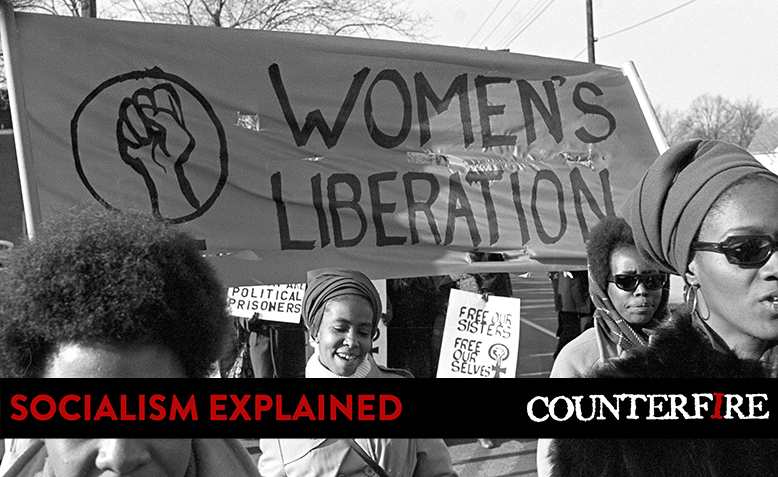 Women's liberation movement. Photo: Linda Napikoski / Wikimedia Commons / banner added to original / CC BY-SA 4.0, licence linked at bottom of article
Women's liberation movement. Photo: Linda Napikoski / Wikimedia Commons / banner added to original / CC BY-SA 4.0, licence linked at bottom of article
Elaine Graham-Leigh analyses where oppression comes from and if it can be overcome
Counterfire’s Socialist Explainers series
Discussions of oppression sometimes give the impression that it’s inevitable. These see oppression as arising from human nature. In this view, individuals are predisposed to be sexist, racist and so on by tendencies that have their roots deep in human biology and prehistory.
This would mean that it would be difficult or even impossible to overcome these inherent traits even in the most progressive society. Clearly this is a depressing conclusion, but is it right?
The history of oppression shows us that in fact, there have been complex human societies which did manage to be genuinely egalitarian. There are examples from all over the world, from Aboriginal Australia, to prehistoric Turkey, the Indus Valley and North America before European colonisation. What these examples all have in common is that not only did they not have oppression, they did not have exploitation either. They weren’t class societies.
This was a key insight of Frederick Engels, in The Origin of the Family, Private Property and the State. Engels traced the origin of women’s oppression – the earliest form of oppression – to the development of class. In a free society, there would be no need for men as a group to try to control women as a group. If, though, some men have started to build up their own private property, the only way they could be sure of passing it on to their own children would be if they controlled the women they had those children with. This was, Engels realised, how women were themselves made into property.
Women’s oppression therefore developed because it served the interests of the earliest ruling class. As well as allowing ruling-class men to control their own property, it also protected ruling-class power by giving lower-class men a stake in the class system. The lower-class men might themselves be exploited, but at least they could lord it over their women.
Other oppressions have developed for similar reasons. Racism can feel so engrained in our society that it’s difficult to imagine that we have ever been without it. In fact, people in the ancient and medieval world weren’t generally that bothered about skin colour. Oppression on this basis was only encouraged by the elites in the early modern period to justify the slave trade.
Other forms of prejudice, such as antisemitism, did exist in the Middle Ages, but even there, its development was encouraged by the ruling class. Pogroms against Jewish communities in medieval Europe were often blamed on the mob, but were almost always driven by people of higher social class.
In the same way again, we can see that homophobia is encouraged to develop in periods when the nuclear family is seen as key to ensuring a continuing supply of exploitable workers. When the ruling class takes this view, then people in gay or lesbian relationships can appear as a threat to this. At other times, they can look more like a potential market with high disposable incomes, so homophobia will start to be officially frowned upon.
What this history shows is that oppression does not develop from human nature. It is, rather, part of the developing way in which the ruling class maintains its power in a class society. It is certainly possible to have a society without oppression; many people in our history have lived in such societies. What isn’t possible is to eradicate oppression without also overthrowing the class system that it was developed to serve.
Join Revolution! May Day weekender in London
The world is changing fast. From tariffs and trade wars to the continuing genocide in Gaza to Starmer’s austerity 2.0.
Revolution! on Saturday 3 – Sunday 4 May brings together leading activists and authors to discuss the key questions of the moment and chart a strategy for the left.

